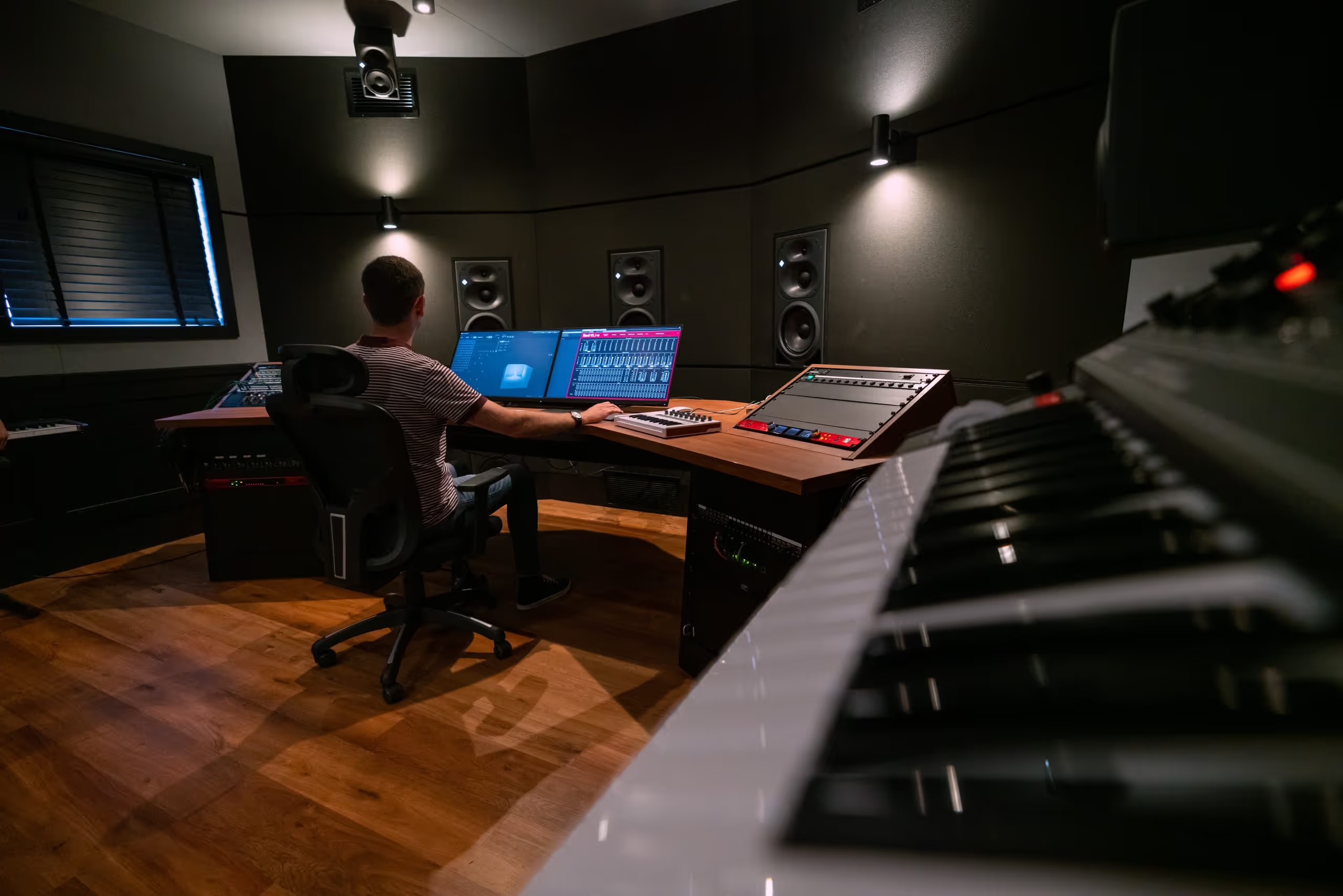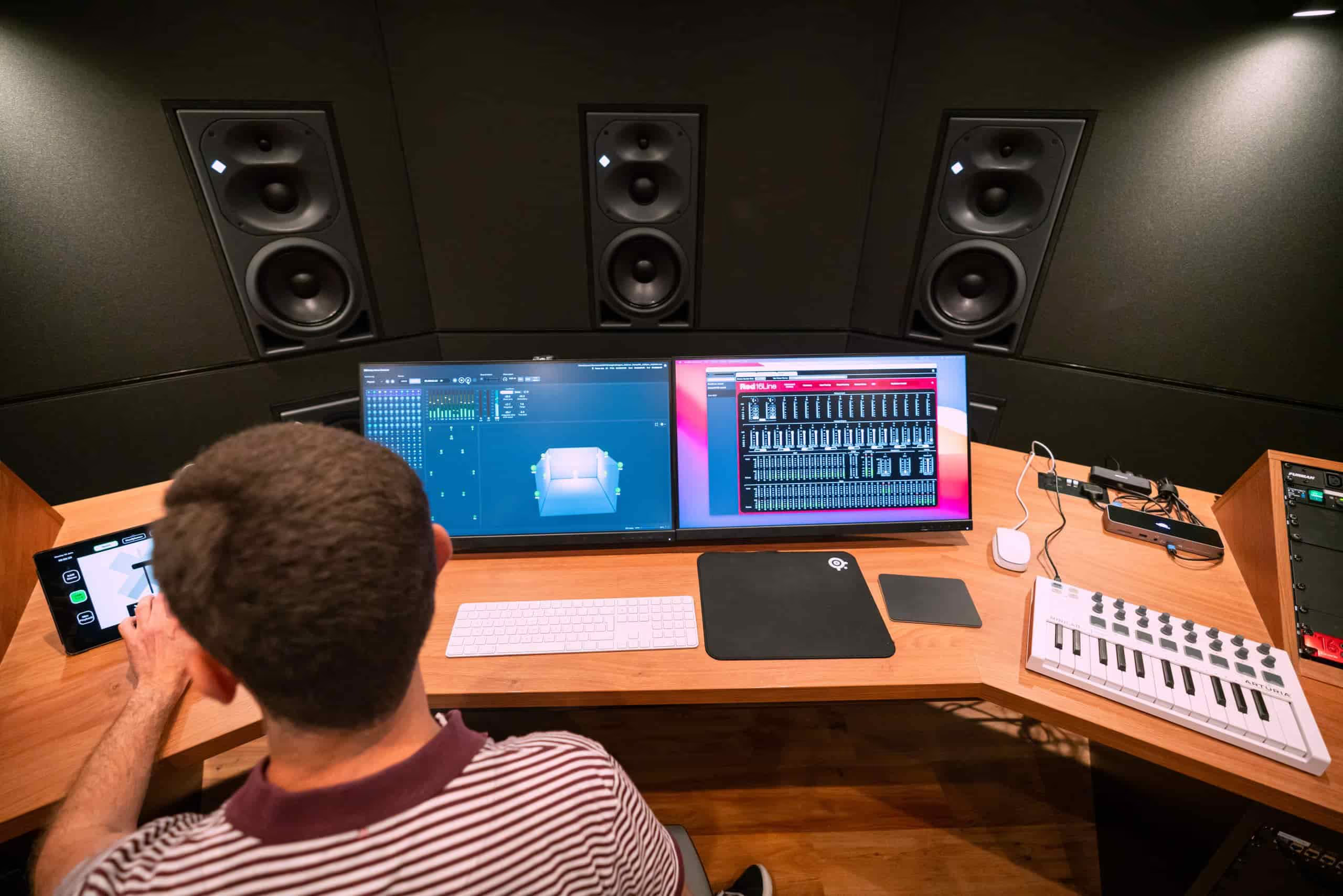What Does Remastered Mean In Music?
This guide explores the remastering process, its impact on sound quality, and why artists choose to remaster their music.
Most remasters try to make an existing release translate better on today’s systems without changing the original mix. Results vary, from barely audible to clearly different. Always compare at the same loudness, within 0.5 dB, before you decide. Large changes in balance or width usually signal a remix, not a remaster.
What is remastering?
Remastering is the process of enhancing the sound quality of an existing master recording using modern technology. It aims to refine the overall sound while preserving the original mix.
This technique has become increasingly common as music formats and playback systems have evolved.
Listening test
If you’ve got good headphones or speakers, compare two versions of Breathe: an early master and the 2023 50th-anniversary remaster by James Guthrie.
Original
Could you spot the difference? Did you notice more sonic clarity, or think it's an improvement and serves the song or album? Sometimes remastering can be very subtle and other times not. In many cases, people prefer the rawness of the original.
Remastering aims to enhance the sound quality of previously released songs or albums. It achieves this by refining the original master recording using modern technology. This process can improve clarity, reduce noise and artefacts where possible, and prepare for formats such as high-resolution streaming or vinyl reissues.
Many classic albums have been remastered to breathe (sorry) new life into old recordings, making them more enjoyable on today's digital platforms. It can also re-spark interest in classic albums resulting in a slew of new sales.
At TYX Recording Studios, we we A B originals and remasters on calibrated monitors in London, level matched within 0.5 dB, and our engineers apply current best practice across formats. We also master tracks to a professional, release ready standard, so we’re well placed to break down the process and what to listen for.
What's the difference between mastering and remastering?
Mastering is the final stage before first release: tonal balance, dynamics, sequencing, and translation across systems.
Remastering revisits an existing stereo master with modern tools (EQ/noise treatment/limited dynamics work/format optimisation) without returning to multitracks.
Remixing opens the multitracks (vocals/drums/guitars) to change balance, effects, and imaging, often a clearly different presentation.
As a rule of thumb, large changes in stereo width suggest a remix, while any imaging shifts from mastering are usually subtle.
When did remastering become common?
Remastering has risen in step with format shifts. Early vinyl masters were cut on analogue chains for turntables. When CDs took over in the 1980s, labels remastered large catalogues to take advantage of the medium’s lower noise floor. The 2010s saw major campaigns, including Pink Floyd’s 2011 Discovery series, followed by the 50th-anniversary remaster of The Dark Side of the Moon in 2023.
Today, high resolution streaming and immersive formats keep the demand going, adapting classic recordings for modern playback. As technology evolves, remastering can help to preserve and present archival material without changing the original performances.
The remastering process: How it works

Neatly summarised, remastering involves enhancing an existing master recording to improve its sound quality and adapt it to modern listening formats. A combination of careful technical attention, the right tools, and skilled professionals is essential.
The success of remastering depends on the condition of the original recording. Ideally, engineers work from the original master tapes or the highest-quality digital files available. If the source material is degraded or incomplete, restoration techniques may be needed before remastering can begin.
Remastering music involves adjusting the frequency balance to enhance clarity, reducing background noise from old recordings, and applying compression to achieve a more consistent volume. These steps adjust the dynamic range while preserving the essence of the original mix. The goal is a polished version that avoids over-processing.
Advances in digital technology allow mastering engineers to refine audio with greater precision. Digital audio workstations, spectral editing, and AI-powered tools help remove imperfections and tidy stereo imaging. The remastering process also adapts recordings to new formats like high-resolution streaming, immersive audio, and vinyl reissues.
A mastering engineer is responsible for remastering music, using their expertise to balance, clean, and enhance the final mix. They work closely with artists, producers, and record labels to ensure the remastered album stays true to the original release while benefiting from modern techniques. A well-executed remaster breathes new life into old recordings, letting them shine in today’s listening environments without losing their original character.
Why does music get remastered?
Artists and record labels choose to remaster albums for various reasons, ranging from technological advancements to artistic and commercial motivations. Remastering music allows recordings to stay relevant, sound better, and reach new audiences.
Some catalogues from the 2000s were mastered to higher loudness. Modern reissues vary, so judge case by case
Adapt to new audio formats and playback systems
As music consumption has evolved from vinyl records to CDs, digital downloads, and streaming, remastering ensures that older recordings sound optimal on modern systems.
New technology enables engineers to refine stereo imaging, dynamic range, and overall sound, making classic albums compatible with high-resolution streaming services and new formats like Dolby Atmos.
Improve sound quality of older recordings
Many albums originally released decades ago suffer from limitations in the original mastering process. Early recordings may have background noise, limited dynamic range, or compressed audio that lacks clarity.
The remastering process corrects these flaws, offering a cleaner, more polished final mix while preserving the authenticity of the original recording.
Commercial reasons (re-releases, anniversaries)
Record labels frequently release remastered editions to celebrate milestone anniversaries or introduce classic albums to a new generation. Special releases, such as box sets or deluxe editions, often include a remastered album alongside unreleased tracks, original artwork, and other audio improvements.
This not only boosts sales but also helps maintain the legacy of an artist’s catalogue.
Artistic reasons (creator's vision, director's cut equivalent)
Sometimes, an artist or producer revisits an album to align it more closely with their original vision. Advances in digital music production allow for a new master that enhances details lost in earlier versions.
Similar to a director’s cut in film, remastered songs may bring out nuances in the final output that were previously overshadowed by the limitations of past production techniques.
Put simply, remastering is a way to bridge the gap between the past and present, ensuring music remains timeless and enjoyable across different listening mediums.
Remastering vs. other audio processes

Remastering is often confused with other forms of audio processing, such as remixing, re-recording, and the original mastering process. While they share similarities, each serves a different purpose in music production.
Remastering vs. remixing
The remastering process focuses on refining the final mix from an existing master recording, adjusting elements such as dynamic range, stereo imaging, and background noise.In contrast, remixing involves going back to the individual tracks of a song (such as vocals, drums, and guitars) and altering their balance, effects, and arrangement.
A remix can sound dramatically different from the original mix, whereas a remastered version retains the essence of the original release but with improved sound quality.
Remastering vs. re-recording
Remastering music enhances the sound of an existing recording, but re-recording involves an artist or band performing the song again from scratch.
Artists may choose to re-record their songs to regain control of their masters, update the overall sound, or reinterpret the track for a modern audience.
Unlike remastering, which works with existing material, re-recording creates an entirely new version of the song.
Remastering vs. original mastering
The original mastering process is the final stage of music production before a song is initially released. It ensures the final mix is balanced, cohesive, and optimised for various playback formats.
Remastering, on the other hand, revisits this final mix (often decades later) to refine it using new technology and modern mastering techniques.
The goal is to enhance the final output while staying true to the original recording.Each of these processes plays a unique role in music production. While remastering breathes new life into old recordings, remixing, re-recording, and mastering serve different creative and technical functions.
Notable examples of remastered music
Many classic albums have been remastered, showcasing significant improvements in sound quality. Some well-known remastered editions include:
The Beatles, Abbey Road (2019)
This edition is a new stereo mix by Giles Martin and Sam Okell, with Atmos and 5.1 options. It is not a straight remaster.
For a quick listen test, line up Here Comes the Sun in its original release and then the 2019 remix.
Here Comes the Sun, original
Here Comes the Sun, 2019 remix
Queen, A Night at the Opera, 2011 Remaster,
This one is a true remaster from Queen’s 2011 campaign. The mix stays the same. What you should notice is cleaner noise handling and a touch more clarity.
Listen to Bohemian Rhapsody original versus the 2011 remaster and focus on the piano transients and the choral section.
Bohemian Rhapsody, original 1975 mix
Bohemian Rhapsody, 2011 Remaster
Michael Jackson, Thriller 40, 2022,
A 40th-anniversary reissue of the original album with a bonus disc of unreleased material. Many platforms also offer immersive versions such as 360 Reality Audio and Dolby Atmos. Treat it as the classic stereo album presented again, with optional immersive mixes rather than a brand-new stereo remix.
Thriller, original
Thriller, 2022 anniversary edition
How do you identify remastered tracks?
If you're wondering how to spot a remastered version of a song or album, here are a few key indicators:
- Check the wording. Credits and platform labels usually say “remaster,” “mix,” “deluxe,” or “Atmos,” and often name the engineer and year.
- Listen with levels matched. Turn the newer version down slightly so both play at the same loudness. Then judge tonal balance, hiss or hum, transient snap and stereo width.
- Look at the packaging. Reissues often come with updated artwork and liner notes that spell out exactly what has been done.
When does remastering make sense for artists?
Remastering can be beneficial for both legacy artists and independent musicians, but it’s important to evaluate the advantages and potential drawbacks before investing in the process.
For legacy recordings
Many classic albums originally released on vinyl records or early CD formats lack the audio clarity and dynamic range of modern recordings.
Remastering music allows legacy artists to bring their old recordings up to modern standards, making them more compatible with digital platforms and high-resolution audio formats.It also helps introduce timeless albums to new audiences while preserving the essence of the original release.
For independent artists considering remastering
Independent musicians who released early projects with limited resources may benefit from remastering.
If an album was originally mixed or mastered with lower-quality equipment, a remastered version can significantly improve its sound.With access to new technology and professional mastering engineers, independent artists can refine their past work and make it more competitive in today’s music industry.
Cost vs. benefit considerations
While remastering can enhance sound quality, it requires financial investment. Hiring a mastering engineer and using modern tools can be costly, particularly for independent artists.
A remastered album can lead to higher engagement on streaming platforms and greater longevity, but outcomes vary by audience and release plan
The decision to remaster should be based on both artistic goals and commercial viability.
Final thoughts
Remastering is often seen as a way to give classic albums a modern touch, but it’s not always a straightforward improvement. While some purists argue that remasters lose the original character of the recordings, others appreciate the clarity and depth that modern technology brings.
The debate is subjective. What sounds better to one person might not to another
Ultimately, remasters help make older music more accessible on today's platforms, but they don’t always capture the magic of the original production. For listeners and artists, it’s a balancing act between preserving the past and adapting for the present.
Take your sound to the next level with TYX Studios

If you're looking to enhance the clarity, depth, and overall sound of your music, professional mastering is key.
At TYX Recording Studios in London, we use state-of-the-art technology and expert techniques to ensure your tracks are polished, balanced, and ready for any listening platform.
Whether you're releasing new music or considering a remastered edition of your past work, our team is here to help you achieve the highest audio quality.
TYX is an end-to-end studio complex. We offer industry-grade production spaces, professional guidance, mastering services, and career support. Moreover, as part of the Tileyard Group, we can easily connect you with artists and industry professionals.
Get in touch now and let TYX Studios elevate your music to professional, release-ready tracks.
Frequently Asked Questions
Not always. Some remastered albums receive criticism for excessive compression or changes that alter the original feel of the music. A well-done remaster preserves the integrity of the original while enhancing its audio quality.
Artists remaster their songs to improve audio quality, adapt to modern playback formats, and reintroduce their music to new audiences. A remastered version can highlight details that were less audible in the original release.
Yes, many remastered vinyl records offer improved sound quality by reducing background noise and optimising dynamic range. However, some collectors prefer original pressings for their vintage character.
Yes, you can work with a TYX mastering engineer in person. Wes offers in-studio sessions where you can collaborate directly with a mastering engineer, providing feedback and insight as your track is fine-tuned in real time
Absolutely! You can record, produce, mix and more at TYX, before using mastering services to ensure your tracks are polished from start to finish.

















.jpg)
.jpg)